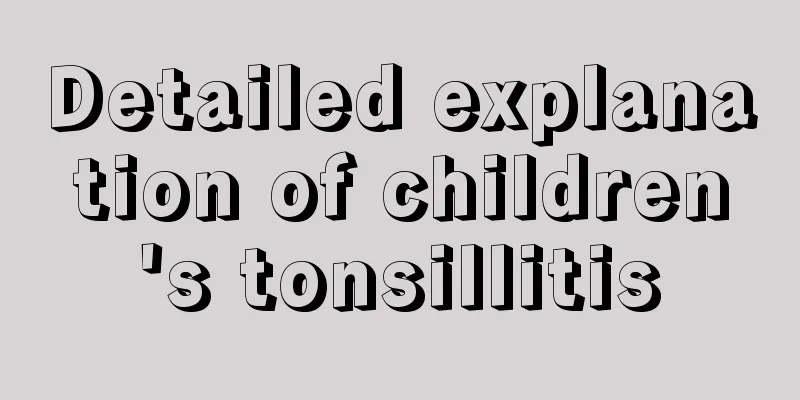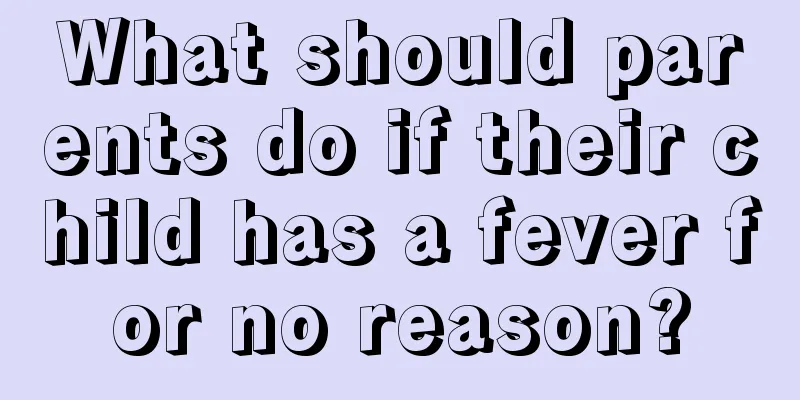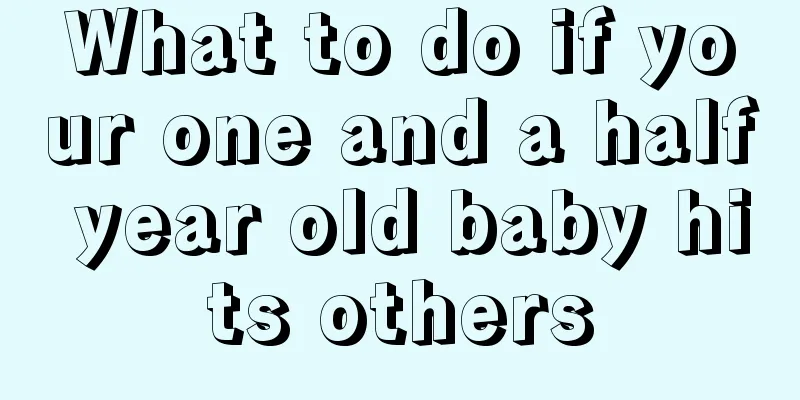Detailed explanation of children's tonsillitis

|
Children are a more sensitive group and are more likely to get sick, so parents should pay more attention to their children's physical health, especially tonsil-related diseases. They should pay more attention during susceptible seasons. What causes children's tonsillitis? Parents are still more concerned about this issue. Let's take a look at the detailed explanation of children's tonsillitis. I believe it will be inspiring. [Where are tonsils?] Tonsils are masses of lymphoid tissue under the epithelium of the oropharynx. According to their location, they are called palatine tonsils, pharyngeal tonsils and lingual tonsils. Among them, the palatine tonsils are the largest, and the tonsils usually referred to are the palatine tonsils. There is a pair of palatine tonsils, located between the lingual palatine arch and the pharyngeal palatine arch. They are oval in shape and covered with stratified squamous epithelium. The epithelium sinks into the tonsil to form 10 to 20 crypts, which contain desquamated epithelial cells, lymphocytes and bacteria. [Function of tonsils] The human pharynx is like an arched door, which is composed of two arched tissues. One is called the palatoglossal arch, and the other is called the palatoglossal arch, which span the two sides to form two pits. Under normal circumstances, a small amount of mucus is secreted, which contains white blood cells and macrophages. Once bacteria or viruses pass through here, they are adsorbed on the mucus and then swallowed and digested. Tonsils are now a recognized immune organ. What causes tonsillitis in babies? [Tonsils block germs] Tonsils serve as the "gateway" to the respiratory and digestive tracts. When bacteria and viruses come, the tonsils are the first to be affected. Once a person's resistance is reduced, bacteria and viruses will multiply here in large numbers, and the tonsils will become inflamed. Inflamed tonsils become congested, swollen, and festering. Many small pus plugs appear in the crypts of the tonsils, and in severe cases they are covered with pus. [4-6 years old is the peak period of tonsillitis] Generally speaking, children under the age of two will not develop tonsillitis, because the tonsils of children under the age of two have not fully matured and do not react strongly to external pathogenic microorganisms. As the tonsils, an immune organ, develop and mature, they begin to become inflamed after the age of two, with the peak period of tonsillitis being 4 to 6 years old. Therefore, parents should pay attention to their children's tonsillitis and avoid missing the opportunity for treatment, which may lead to chronic tonsillitis or even nephritis. [Acute tonsillitis] When children's tonsils are inflamed, the systemic infection symptoms are very obvious. The baby will show: high fever can reach 39℃~40℃, accompanied by chills, general fatigue, headache and body pain, loss of appetite, nausea and vomiting. When the doctor examined the pharynx, he found pus on the tonsils. This is the strongest evidence because systemic symptoms alone cannot distinguish it from other colds. [Chronic tonsillitis] Enlarged tonsils caused by chronic tonsillitis can cause breathing difficulties, especially during sleep, because the tongue relaxes and falls back, causing snoring like thunder. Over time, chronic hypoxia will affect growth and development. Chronic hypoxia will also affect the baby's intellectual development. If you encounter the above situation, parents should take your baby to see a doctor. Both acute and chronic tonsillitis can cause a variety of complications and endanger children's health. Local complications include acute otitis media, rhinitis, sinusitis, pharyngitis, cervical lymphadenitis, peritonsillar abscess, etc. Common systemic complications include rheumatism, acute glomerulonephritis, sepsis, arthritis, skin diseases (such as psoriasis), myocarditis, bronchial asthma, etc. It can also cause severe acute nephritis. The above is a detailed explanation of children’s tonsillitis. Parents can learn about it. Parents can learn more about the relevant knowledge in their daily lives. Special attention should be paid to children. Children’s tonsillitis is a relatively common phenomenon, but it cannot be ignored. You should still be more careful, otherwise it will be harmful to your health. |
<<: What causes tonsillitis and fever in children?
>>: What to do if your child has a sore throat
Recommend
What causes high white blood cell count in children?
Some common diseases among children include fever...
Sinusitis in children causing cough
Children suffer from sinusitis and cough, which i...
9 and a half month baby development indicators
When the baby is 9 months old, his body enters a ...
What issues should 4 and a half months old babies pay attention to?
Newborn babies need to pay attention to their phy...
What is the treatment cycle for neonatal pneumonia?
Pneumonia is a common disease among many babies. ...
What causes eye pain in children?
Eyes are very important to humans. They can lead ...
3 major hazards caused by baby powder
Some mothers, after bathing their babies, will ap...
What should I do if my child has severe toothache?
Toothache is the most common oral disease. Adults...
Reasons why children sweat while sleeping
In fact, parents will find that some children oft...
Child's uncoordinated movements
It is understood that there are great differences...
The baby hums while feeding
The expression of the baby while feeding is what ...
What should I do if my younger brother doesn't listen?
Raising children is an activity in life that requ...
Is a child's fever of 40 degrees dangerous?
Children's high fever must not exceed 40 degr...
How to improve the newborn baby's refusal to drink water
Newborns have relatively weak physical constituti...
Simple nutritious meal recipes for children
Children are in a stage of laying the foundation ...









